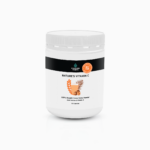Antibiotics have their place in the world – they were founded for a good reason and have helped many people. However, their misuse and overuse is concerning.
Doctors are prescribing antibiotics up to 9 times more than they should according to the current guidelines, with over 4 million individuals receiving a prescription which may not even benefit them. Antibiotics are used to treat bacterial infections, such as pneumonia and infected wounds. Yet many conditions such as ear, sinus and stomach issues are wrongly prescribed antibiotics, as they are often not a bacterial infection.
We have 2kg of essential microbes living within our gut that provide us with 80% of our immune system, produce vitamins and minerals, allow us to detoxify, digest our food, produce essential neurotransmitters to regulate our mood, sleep and wake cycle, and more. Antibiotics can change the microbiome of the gut and result in health problems.
Antibiotic use in the food industry
Antibiotic exposure goes far beyond what people are being prescribed by their doctor – it is also used in the food industry. In the US, 80% of all antibiotics sold were for use in food-producing animals like cows, poultry, pigs and even fish to treat infections. Residues of the antibiotics used to treat these animals have been found in food products including milk. Although there are improving standards of testing to ensure these residues don’t enter our food system, there is still a chance that you are being exposed to it daily – in fact, low levels of antibiotic residue in food are actually legal.
Our high exposure to antibiotics – whether prescribed or via residues in the food that we eat – is also contributing to the prevalence of antibiotic resistant bacteria, known as ‘super bugs’. Particular strains of bacteria like Salmonella, Entercocci and Campylobacter are becoming resistant to treatment by antibiotics, which is a serious concern. There is also evidence of antibiotic resistant bacteria being transferred from animals to humans.
How to avoid antibiotics in food
I recommend avoiding the consumption of meat and other products from animals that are treated with antibiotics to ensure that you are not exposed to either the antibiotic or the antibiotic resistant bacteria. If you purchase organic meat in Australia, the animal will not have been given antibiotics – good news indeed! So purchase organic where possible.
I also suggest sustainable meat eating – demand for the ‘fine cuts’ of meat has contributed greatly to the overproduction of other animal proteins and dairy. Appreciate the whole animal, by using highly nutritious parts like bones and liver which will often be wasted in most cases – here is a chicken liver pate to get you started! Again, use organic liver where possible.
I also advise using antibiotics only when absolutely necessary. The power of herbs to treat infections is completely underestimated, yet these natural remedies have existed for thousands of years and still show to be effective. Aim to use nature’s antibiotics like oil of oregano, garlic, thyme, wormwood, coconut oil and Pau D’Arco. Use food as your medicine – avoid those foods that are dampening your own natural immune defense, like wheat, gluten, genetically modified seed oils, preservatives and sugar and increase the consumption of cleansing foods like leafy greens, coriander, parsley, seaweed and fermented foods. Chicken broth, liver pates and organic meats will also nourish your body naturally.
What are your thoughts on this? Have you found any more important and relevant information on this topic? I’d love to hear from you.
Sheridan Austin
Nutritionist and GAPS Practitioner









Experienced 1st hand the over prescription of antibiotics with my son a few weeks ago! Stool testing came back positive for dientamoeba fragilis and mild gut symptoms hadn’t resolved. Dr offered a prescription but when I asked if there was an alternative he said “don’t worry, it doesn’t really need to be treated”. Straight to our naturopath for a herbal which is doing the trick! Plus loads of gaps soups! Tummy is a bit sensitive so I’m grateful I’ve read GAPS 5+ times to help guide the food I’m giving him atm.